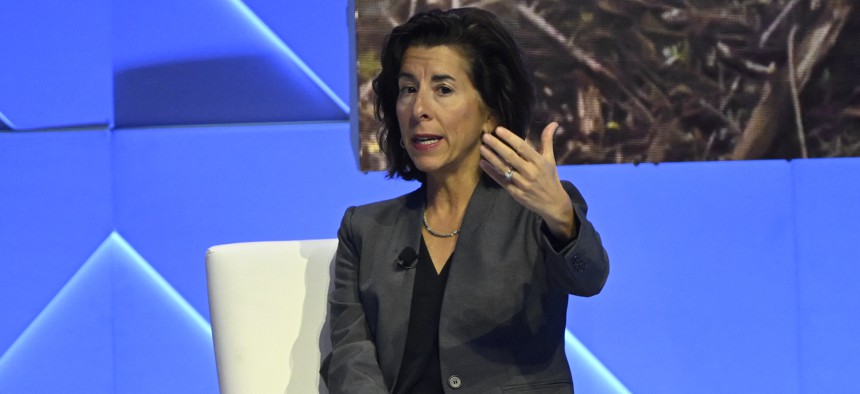Chip manufacturers operational by 2030 will get priority in Commerce funding, secretary says

Commerce Secretary Gina Raimondo speaks at the opening session of the Asia-Pacific Economic Cooperation leaders' week in San Francisco in November 2023. ANDREW CABALLERO-REYNOLDS/AFP via Getty Images
Commerce Secretary Gina Raimondo said that the agency intends to “maximize our impact in this decade.”
The Department of Commerce announced new goals for funding U.S. private sector companies on Monday, looking to drive domestic semiconductor manufacturing through more judicious investments.
Commerce Secretary Gina Raimondo discussed the “tough negotiations” with private industry partners to ensure that public funding is being spent responsibly while simultaneously executing the provisions stipulated in the CHIPS and Science Act to spur more semiconductor manufacturing in the U.S.
Despite the Biden administration’s enthusiasm for a strong ecosystem of public-private partnership, Raimondo said that funding for fabs — the plants that manufacture semiconductors — will now prioritize projects slated to be operational by 2030.
Raimondo framed the need for more immediate deliverables from potential grant recipients as a matter of national and economic security, and a key step in crystallizing U.S. leadership in emerging technologies, while also protecting public funding.
“We have to be tough with companies,” Raimondo said during a talk hosted by the Center for Strategic and International Studies. “Our tough negotiations with individual companies will result in each one of them doing more for economic and national security at a lower cost to the taxpayer.”
This change in semiconductor manufacturing funding decisions will result in shelving otherwise promising projects with a longer operational timeline.
“We're saying no for now to those projects, because we want to maximize our impact in this decade,” she said.
The immediate response from one advocacy group supported Commerce’s decision.
“The administration’s 2030 deadline is an ambitious goal and will help restore U.S. leadership in the global semiconductor ecosystem,” Information Technology Industry Council President and CEO Jason Oxman told Nextgov/FCW.
Raimondo also noted that the burgeoning U.S. chip sector is expected to surpass the estimates for job creation made about one year ago.
“We think our investments in leading edge logic chip manufacturing will put this country on track to produce roughly 20 percent of the world's leading edge logic chips by the end of the decade,” she said.
Over 600 statements of interests on proposed semiconductor projects have been submitted to the Department of Commerce since the application was put out a year ago, according to Raimondo, who said the “brutal reality” is that the vast majority of these companies will not receive funding despite being “excellent.”
“Our job is to make targeted investments in relentless pursuit of achieving our national security objectives,” she said.
A major driver of Commerce’s priority shift is the need to fast track chips manufacturing projects that can deliver semiconductors to power artificial intelligence and large language models, and the simultaneous need to not depend on foreign adversaries for these critical components.
“These are the large language models to train military equipment, nuclear simulation, satellites, bioterrorism,” Raimondo said. “You cannot lead the world, as the United States of America, if you don't lead the world in this kind of technology and innovation, including manufacturing.”



